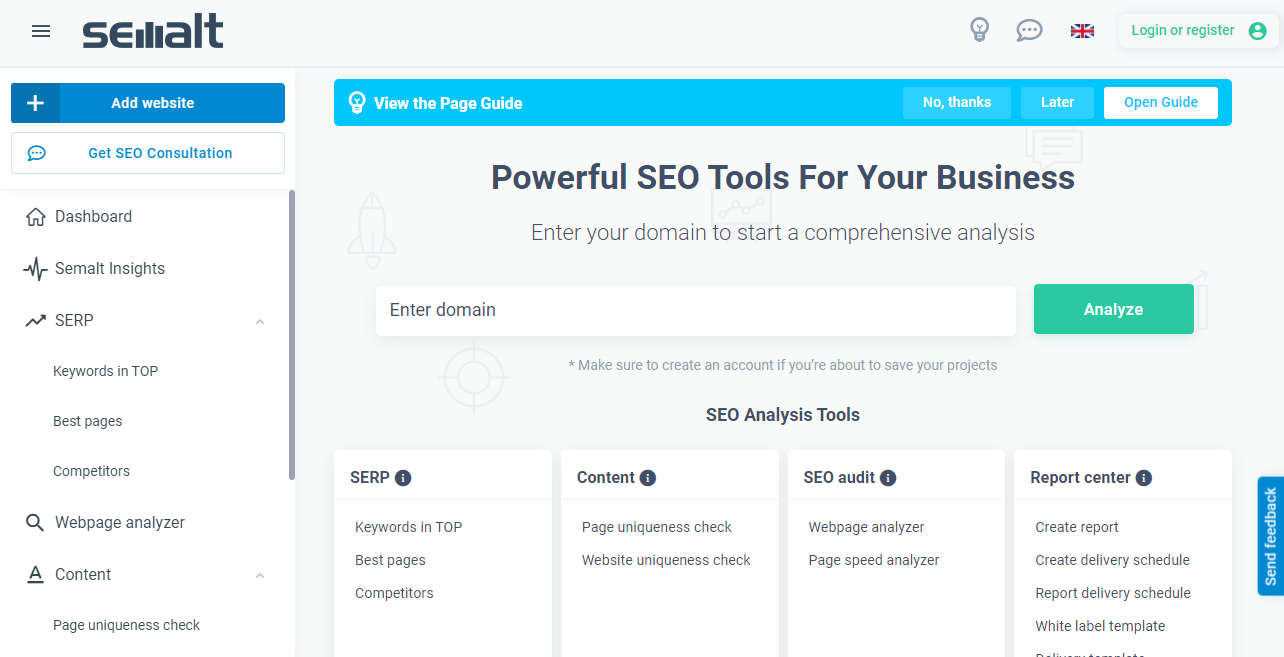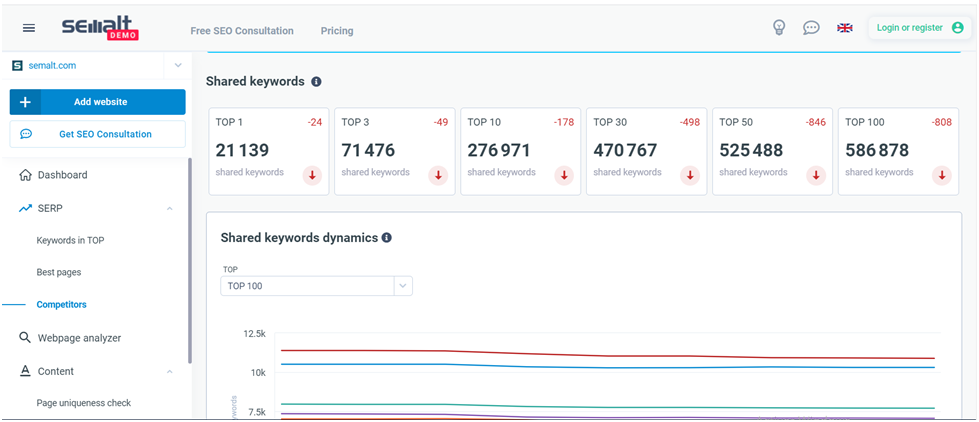Semalt SEO Agency. Get To Know What Semantic Seo Is

Semantic SEO is content optimization made by considering other questions that visitors may ask about the same topic, apart from the subject they search for in search engines. The purpose of this strategy is to create comprehensive content that includes all similar keywords except the target keywords you have determined.
In short, in semantic SEO, you optimize your content according to topics, not in a keyword-oriented manner as in traditional SEO. In this way, you can implement a more successful marketing strategy by improving your site traffic.
E.g.: In the "How to do SEO" article, it will be a good example of semantic SEO to touch on topics such as on-site SEO, technical SEO, local SEO, off-page SEO, international SEO, negative SEO.
However, while creating content, meaningful and quality content should be created apart from different keywords.
Although not fully explained, we see that Google places more value on websites that develop a successful semantic SEO strategy. In our article, we will explain how to do semantic SEO and how to create a semantic SEO strategy.
How to Do Semantic SEO?
All search engines, especially Google, aim to provide the most accurate results to visitors. However, they pay more attention to presenting a general result on the subject being searched first. In the semantic SEO strategy, you must first find all the questions on the subject. In this way, you can create quality content that will answer all such questions.
Content in the field of semantic SEO should always appear qualified and should answer all questions about the subject it is related to. That's why you should do a very detailed research process before creating content.
When internet users visit your website and do not find your content interesting, they may leave your website within a few seconds. But they spend longer time on your website when there is engaging content. Therefore, when you have a good semantic SEO strategy, it is inevitable that your website authority will become much higher in quality.
Subject integrity is important in your semantic search engine optimization strategy. For this reason, following some steps while writing semantic content will provide you with higher quality content.
1. Target Keywords Should Be Researched
If you are going to create content and your subject is clear, you should first research the target keywords. Because in semantic SEO, you need to respond to all searches related to that topic. For this reason, start by identifying all keywords with high and medium search volume.
2. Link Your Content Semantically
If you are going to share a detailed topic while creating content, it is very important that the links are compatible with each other. Semantically unconnected sentences reduce the quality and readability of your content. That's why all your sentences should be linked. At the same time, you should make the subject readable by making smooth transitions between paragraphs.
3. Make Sure You Answer All Questions
If you are creating SEO-friendly content, you need to answer all the questions about the topic you are writing about. That's why it's imperative that you do so with a wide range of questions about the target topic in mind. Do not publish your content until you are sure you have answered all the relevant questions.
4. Increase Your Headline and Keyword count
The number of titles and keywords on your page is also very important. In semantic SEO, you should use subheadings that are related to each other and in a hierarchical order. In addition, you should use more than one keyword in the content.
When you develop a semantic SEO strategy, the number of organic visitors to your website will increase. At the same time, your website will not be seriously affected by the search results after the changing algorithms. Thus, you can always stay ahead of your competitors by remaining in a stronger position.
A semantic SEO strategy requires quality content, an extensive title pool, and the use of multiple keywords.
What Factors Affect Semantic SEO?
Rather than pairing keywords together during a search experience, the real meaning of search lies in semantic SEO. There are two different factors that affect semantic SEO.
1. Meaning of Search
In search, it's all about looking at the meaning behind the words and phrases. If websites detect the true meaning behind the search terms, they can create more qualitative and powerful content in terms of SEO. First, you need to understand the needs and wants of users and create quality and sufficient content accordingly.
2. Search Intent
Search intent is especially important in semantic SEO. First of all, every internet user's intention to search in search engines is different. While some people purchase a product, others experience searching to purchase services or obtain information.
When creating semantic content, you must first create content that will meet the search intent. This is because search engines always try to rank the most relevant content based on user intent.
How to Create a Semantic SEO Content Strategy?
When you prepare a content writing plan suitable for semantic SEO, it is necessary to ensure that all subheadings related to the query and the subject are in a hierarchy in searches. While creating a semantic SEO content strategy, we recommend that you use the DSD by doing keyword research according to sub-topics and paying attention to search volumes.

Here are some tips for a Semantic SEO content plan:
- First, as you research the topic, list all the queries in a hierarchical order.
- Identify why each query is being searched, namely the search intent and user intent.
- While researching the subject, try to take into account many factors such as the person, institution, country, place and date.
- Determine how many different types of content you can create on your chosen topic.
- Show search engine bots what purpose your content serves by using the URL's meta tag, keywords, anchor texts, titles, FAQ schemas or various schemes in your content.
- Decide how you will connect the different content you will create within a certain hierarchy. It would be good to specify even the anchor texts here.
- Before creating content, review the layout, content and design of competing websites on the search engine results pages. Don't forget to plan your content to get ahead of your competitors.
- Make sure your visitors benefit from your content. Therefore, make it your goal to create personalized content.
- Take all measures to ensure that your content is understood by search engines.
Keyword Research in Semantic SEO
In your content, which is based on a semantic SEO strategy, it is more accurate to focus on the whole topic instead of just focusing on the keyword. For this reason, keyword research in semantic SEO is a bit different from normal keyword research. In this process, you don't do a single query. You find keywords by performing many interrelated queries.
Here are some tips on Semantic SEO keyword research:
- First, identify free and paid tools where you can do keyword research. You can use many tools such as Google Ads Keyword Planner, Semalt's Dedicated SEO Dashboard, Ahrefs Keywords Explorer, SEMRush Keyword Magic Tool, Moz Keywords Research for semantic searches.

- You can also use the autocomplete feature on the search bar by Google and YouTube, "Users Also Asked" suggestions at the bottom of Google's search results, and Google-related searches. These methods will give you information about the words that users search for the most.
- Although it is not well known, we recommend that you use Wikipedia effectively for semantic SEO keyword research. (This method is used by many SEO experts and content writers abroad.)
- You can use it for keyword research in many areas such as YouTube video titles, comments, forum topics, news sources.
The point you need to pay attention to when researching keywords for semantic SEO is to understand users' expectations and demands. You will be more comfortable if you group the words according to the search purposes of the users.
Considerations in Semantic SEO
For semantic SEO studies to be efficient and provide the desired results, you need to pay attention to the following points.
1. Always Target the Topic in the Content
The basic operating principle of Google is to provide appropriate answers to visitors. As a result of the letters and words typed in the search section, a page of results is provided according to what they are querying. In semantic SEO, you can get the most effective results when you target the topic directly. If you include subtopics in addition to the main topic, inclusive content will emerge. Content with semantic integrity always gets more attention.
2. Try to Answer Users' Questions
If you want to turn the content you create into future-proof content, you should find all the questions related to your topic. The more correct answers you give to these questions in the content, the more traffic you will get. Although this is a simple strategy, it always stands out as one of the most successful content strategies.
3. Don't Neglect Voice Call Targeting
In recent years, the place of voice searches in Google searches has started to increase day by day. So never stop targeting voice calls. To achieve this, it will always be appropriate to use natural language. Content written using natural language always serves semantic SEO.
4. Engage Visitors with Multimedia Items
Visual and audio multimedia content is as important as text content on your websites. Thanks to these contents, you can keep your visitors on your website longer. With certain media tools, you can create higher quality content for meaning.
The main multimedia elements you can use are: photos, galleries, audios, videos, animations. In this way, you can make the visitor stay longer on your website. In doing so, don't forget that your content must respect the semantic integrity of semantic referencing.
Many content developers and website owners do not understand the importance of content strategies. Especially very few people understand that strategies such as semantic SEO will bring success. For this reason, with semantic SEO studies, you can permanently reach the top by spending a little more time on quality content.
What Does Semantic SEO Gain You?
Semantic SEO is a content strategy used by many website owners and content writers in recent years. This strategy has some very important advantages for your website and page.
The most known semantic SEO advantages can be listed as follows:
- You will have a chance to rank higher on the keywords you specify.
- Your place will be solid in the high rankings you get on the Google results pages. So you can stay on top for a long.
- You can stand out from your competitors on Google search results pages.
- You can achieve meaningful integrity in your content much more easily. Topic integrity in very long content can be easily achieved with semantic SEO.
- As you prepare comprehensive content, you have access to more users and a wider base.
- You can get the chance to increase your customer potential and your sales.
- You can drive more traffic to your website.
- You can attract the right internet users to your website through search engines.
As you can see, the semantic SEO strategy offers very important possibilities for your website. At the same time, with this method, your website begins to function as a more semantic whole. Websites that target content in terms of topics can continuously attract organic traffic with a semantic SEO strategy. In addition, this strategy is a very popular technique with the Google search engine.
We hope this article has helped you optimize your website. We will be happy if you share our article on social media. You can also comment on our article with any questions you may have.